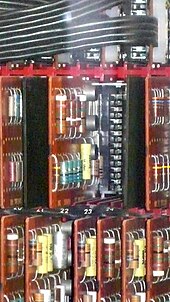| Release date | 1958 |
|---|---|
| Memory | 5,000 or 9,990 words |
| Predecessor | IBM 650; IBM 705 |
| Successor | IBM System/360 |
 IBM 7074 | |
| Release date | 1960 |
|---|---|
| Memory | 5,000 to 30,000 words |
| Predecessor | IBM 7070 |
| Successor | IBM System/360 |
| Release date | 1961 |
|---|---|
| Successor | IBM System/360 |
IBM 7070 is a decimal-architecture intermediate data-processing system that was introduced by IBM in 1958.[1] It was part of the IBM 700/7000 series, and was based on discrete transistors rather than the vacuum tubes of the 1950s. It was the company's first transistorized stored-program computer.[2]

The 7070 was expected to be a "common successor to at least the 650 and the 705".[3] The 7070 was not designed to be compatible with the 650 instruction set, as the latter had a second jump address in every instruction to allow optimal use of the drum, something unnecessary and wasteful in a computer with random-access core memory. As a result, a simulator was needed to run old programs. The 7070 was also marketed as an IBM 705 upgrade, but failed miserably due to its incompatibilities, including an inability to fully represent the 705 character set;[citation needed] forcing IBM to quickly introduce the IBM 7080 as a "transistorized IBM 705" that was fully compatible.
The 7070 series stored data in words containing 10 decimal digits plus a sign.[a] Digits were encoded using a two-out-of-five code. Characters were represented by a two-digit code. The machine shipped with 5,000 or 9,990 words of core memory[4] and the CPU speed was about 27KIPS.[citation needed] A typical system was leased for $17,400 per month or could be purchased for $813,000.
The 7070 weighed 23,150 pounds (11.6 short tons; 10.5 t).[5]
Later systems in this series were the faster IBM 7074 introduced in July 1960[6] and the IBM 7072 (1961), a less expensive system using the slower 7330 instead of 729 tape drives. The 7074 could be expanded to 30K words. They were eventually replaced by the System/360, announced in 1964.
- ^ "Trucks, sheep and the IBM 7070". IBM. Archived from the original on 2005-01-22.
- ^ Emerson W. Pugh, Lyle R. Johnson, John H. Palmer, IBM's 360 and early 370 systems, MIT Press, 1991, ISBN 0-262-16123-0, p. 50
- ^ Bashe, Charles J.; Johnson, Lyle R; Palmer, John H.; Pugh, Emerson W. (1986). IBM's Early Computers. MIT. p. 473. ISBN 0-262-02225-7.
- ^ IBM 7070 Reference Manual (PDF). IBM. pp. 8–9. A22-7003-1.
- ^ Weik 1961.
- ^ "A Quicker Computer Introduced by I.B.M.". New York Times. July 8, 1960. p. 29.
Cite error: There are <ref group=lower-alpha> tags or {{efn}} templates on this page, but the references will not show without a {{reflist|group=lower-alpha}} template or {{notelist}} template (see the help page).